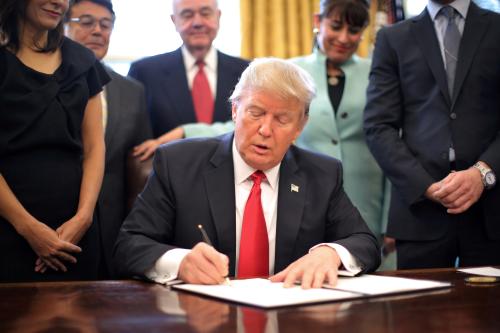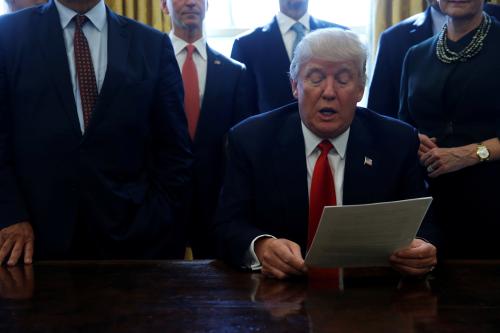Throughout his campaign for president, Donald Trump promised to reduce the number of existing federal regulations and curb the number of new regulations enacted. With one of his first acts after assuming office, President Trump took the first step toward fulfilling that promise by signing Executive Order 13771, which requires that “for every new regulation issued, at least two prior regulations be identified for elimination, and that the cost of planned regulations be prudently managed and controlled through a budgeting process.” Trump advisor Steve Bannon raised expectations for this work early on when he promised that the administration would be undertaking a “deconstruction of the administrative state.”
Clearly, the Trump administration has big deregulatory ambitions. But how much deregulation is actually happening?
To help answer that question, experts at the Center on Regulation and Markets at Brookings have built a new online tool that collects information on deregulatory activity across federal agencies.
Visit the tracker here: https://www.brookings.edu/RegTracker
By using the tool, you can monitor a curated selection of delayed, repealed, and new rules, notable guidance and policy revocations, and important court battles across nine major categories, including energy, health, labor, and more. We’ll be continually updating the tracker to reflect recent events, and you can stay on top of new deregulatory activity by signing up for email updates.
Meanwhile, we have yet to see how the regulatory process changes signaled in Trump’s executive order will play out. One of the administration’s biggest challenges is to get its new “regulatory budget” process to play a constructive role in addressing regulatory accumulation without becoming an effective moratorium on new regulatory action or a spur to haphazard cutting. In a new paper evaluating the Trump administration’s approach and its regulatory budget, Brookings Vice President and Director of Economic Studies Ted Gayer, the Council on Foreign Relations’ Robert Litan, and Brookings Senior Fellow Philip Wallach argue that, although the budget has the potential to bring about meaningful and deep-reaching change, it’s also possible—but not inevitable—that the ambitious scope of the reforms could instead create a massive bureaucratic headache. That’s because, according to existing guidance, Trump’s reforms will seek to measure the costs of regulatory activity in a much more complex way than any approach currently underway, even when considering regulatory budgets in Canada and the UK.
To learn more about the rationale for Trump’s regulatory changes, the lessons from other countries, the legal and practical challenges, and the best and worst case scenarios for the new processes, watch Ted Gayer, Philip Wallach, and other experts discuss whether Trump’s ambitious deregulatory agenda can succeed: https://www.brookings.edu/events/can-trumps-ambitious-deregulatory-agenda-succeed/.
The Brookings Institution is committed to quality, independence, and impact.
We are supported by a diverse array of funders. In line with our values and policies, each Brookings publication represents the sole views of its author(s).







Commentary
A new tool to help you track deregulation under Trump
October 24, 2017